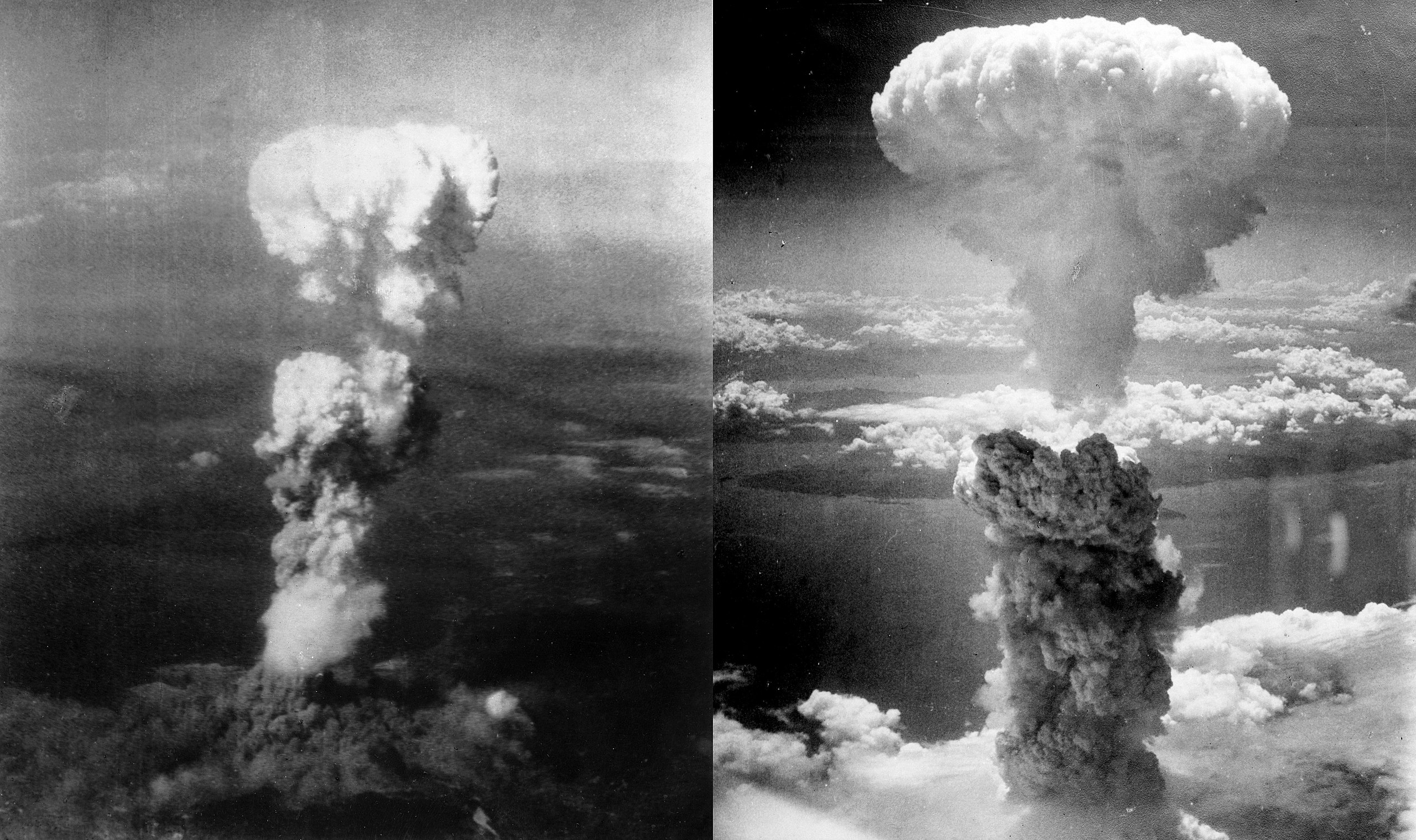Atomic bombings of Hiroshima and Nagasaki: Difference between revisions
From ProleWiki, the proletarian encyclopedia
More languages
More actions
(Created) Tag: Visual edit |
(Background) Tag: Visual edit |
||
| Line 1: | Line 1: | ||
[[File:Atomic bombing of Japan.png|thumb|Mushroom clouds over Hiroshima (left) and Nagasaki (right)]] | [[File:Atomic bombing of Japan.png|thumb|Mushroom clouds over Hiroshima (left) and Nagasaki (right)]] | ||
On 6 and 9 August 1945, the [[United States of America|United States]] bombed the [[Empire of Japan (1868–1947)|Japanese]] cities of Hiroshima and Nagasaki with [[Nuclear weapon|nuclear weapons]], killing around 200,000 civilians. It was the only time nuclear weapons have ever been used in warfare. In 1946, the [[United States Department of Defense|U.S. Department of War]] admitted that the bombings were not necessary and that Japan would have surrendered in 1945 without either the bombings or a ground invasion. General and President [[Dwight D. Eisenhower]] also opposed the bombings.<ref>{{Web citation|author=[[Ben Norton]]|newspaper=[[Geopolitical Economy Report]]|title=Atomic bombing of Japan was not necessary to end WWII. US gov’t documents admit it|date=2023-08-07|url=https://geopoliticaleconomy.com/2023/08/07/atomic-bombing-japan-not-necessary/|retrieved=2023-08-08}}</ref> | On 6 and 9 August 1945, the [[United States of America|United States]] bombed the [[Empire of Japan (1868–1947)|Japanese]] cities of Hiroshima and Nagasaki with [[Nuclear weapon|nuclear weapons]], killing around 200,000 civilians. It was the only time nuclear weapons have ever been used in warfare. In 1946, the [[United States Department of Defense|U.S. Department of War]] admitted that the bombings were not necessary and that Japan would have surrendered in 1945 without either the bombings or a ground invasion. General and President [[Dwight D. Eisenhower]] also opposed the bombings.<ref>{{Web citation|author=[[Ben Norton]]|newspaper=[[Geopolitical Economy Report]]|title=Atomic bombing of Japan was not necessary to end WWII. US gov’t documents admit it|date=2023-08-07|url=https://geopoliticaleconomy.com/2023/08/07/atomic-bombing-japan-not-necessary/|retrieved=2023-08-08}}</ref> | ||
== Background == | |||
[[Union of Soviet Socialist Republics (1922–1991)|Soviet]] troops entered Japanese-occupied [[Empire of (Great) Manchuria|Manchuria]] and [[Korea]] on 8 August 1945, exactly three months after [[German Reich (1933–1945)|Germany]] surrendered.<ref name=":12">{{Citation|author=Stephen Gowans|year=2018|title=Patriots, Traitors and Empires: The Story of Korea’s Struggle for Freedom|chapter=The Patriot|page=72|pdf=https://ipfs.io/ipfs/bafykbzaced4iiga4ngtxusr2civjxewbili5jne2sbpefbx2s3im2kphattzc?filename=Stephen%20Gowans%20-%20Patriots%2C%20Traitors%20and%20Empires_%20The%20Story%20of%20Korea%E2%80%99s%20Struggle%20for%20Freedom-Baraka%20Books%20%282018%29.pdf|city=Montreal|publisher=Baraka Books|isbn=9781771861427|lg=https://libgen.rs/book/index.php?md5=8435F6FF91279531705764823FDC2A7F}}</ref> | |||
== References == | == References == | ||
[[Category:War crimes]] | [[Category:War crimes]] | ||
[[Category:History of Japan]] | [[Category:History of Japan]] | ||
Latest revision as of 20:25, 8 August 2023

On 6 and 9 August 1945, the United States bombed the Japanese cities of Hiroshima and Nagasaki with nuclear weapons, killing around 200,000 civilians. It was the only time nuclear weapons have ever been used in warfare. In 1946, the U.S. Department of War admitted that the bombings were not necessary and that Japan would have surrendered in 1945 without either the bombings or a ground invasion. General and President Dwight D. Eisenhower also opposed the bombings.[1]
Background[edit | edit source]
Soviet troops entered Japanese-occupied Manchuria and Korea on 8 August 1945, exactly three months after Germany surrendered.[2]
References[edit | edit source]
- ↑ Ben Norton (2023-08-07). "Atomic bombing of Japan was not necessary to end WWII. US gov’t documents admit it" Geopolitical Economy Report. Retrieved 2023-08-08.
- ↑ Stephen Gowans (2018). Patriots, Traitors and Empires: The Story of Korea’s Struggle for Freedom: 'The Patriot' (p. 72). [PDF] Montreal: Baraka Books. ISBN 9781771861427 [LG]
